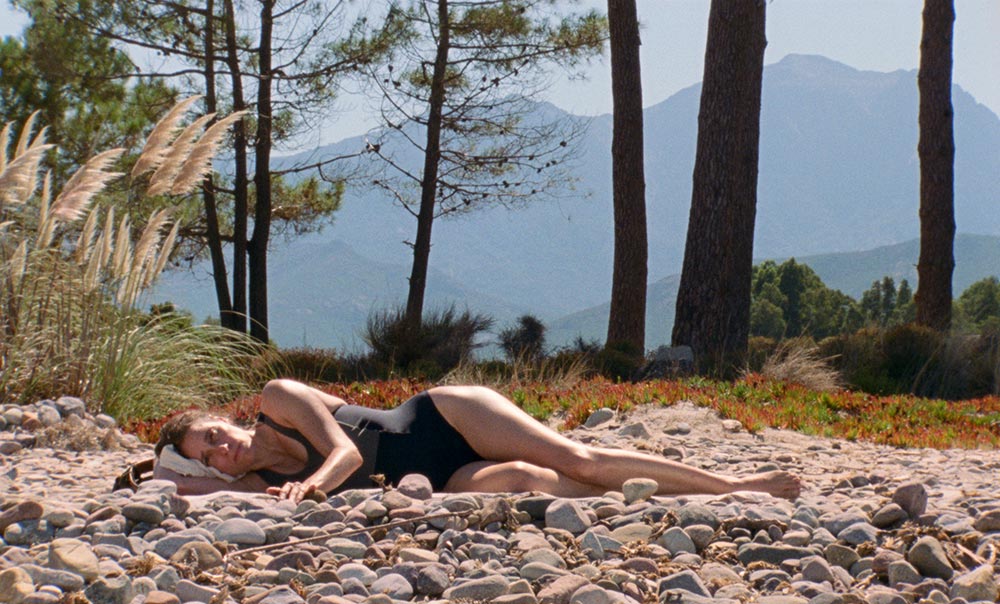If yachts are your thing but ham-fisted class-struggle allegory is not, skip Triangle of Sadness and go see Helena Wittmann’s Human Flowers of Flesh (both 2022). The title, though sexy, has very little to do with the film. (Wittmann borrowed it from a friend, who came up with it on a lark.) Indeed, because of the obvious allusions to Claire Denis’s homosocial Melville adaptation, Beau travail (1999), I was hoping to see a lot more human flesh flowers than I did. Alas, Denis’s svelte recruits dancing in the sun are here replaced by a motley gang of young weekenders on a ketch, more often than not below deck, dappled with the wandering shadows of a seaborne vessel’s portlights.
For a movie nominally about the French Foreign Legion, there’s very little direct engagement with legionnaires, drills, abusive command chains, and the like. Instead we follow an international group of friends (or acquaintances—the script provides zero backstory) who are leisurely sailing around the Mediterranean in search of some sign of the Legion, whether a solitary legionnaire somewhere or a whole training camp. (The question of why they are approaching their research so haphazardly is not addressed.) They smoke cigarettes, futz with the rigging, read each other passages of Marguerite Duras, call at ports to shop for fruit, and flip through vintage postcards that legionnaires sent to their loved ones half a century ago.
There are a grand total of seven shots of legionnaires. We see the face of only one guy, standing rigidly and clutching a FAMAS G2; as for the rest, we only see the backs of their heads, their arms, their shadows. We hear them offscreen singing “Adieu vieille Europe,” a traditional Foreign Legion song that originated in the 1932 French film Sergeant X. We hear bits and pieces about life in the Legion through anecdotes and letters. At a pizza truck across the street from Camp Raffalli garrison in Haute-Corse, two members of our crew eavesdrop on a recruit’s story about a comrade who was forced to eat rotten meat with his hands. A man at a bar talks about the emotional toll of a recruit’s solitude: “Everyone looking for closeness and other bodies. It’s raw and tender at the same time.” This hints at the tense eroticism of Beau travail, but the closest we get to seeing any half-naked men wrestling in the sand is a ripped German recruit in briefs fastidiously making his bed (direct Denis reference). Most of the film’s runtime is taken up by our leisure sailors gazing into the distance longingly. Or is it out of boredom? It’s hard to tell the difference. Are they pining for authenticity? The ropey, tarry, salty authenticity that renting a two-masted yacht for a few days can give them a taste of?
Then there’s Denis Lavant, whom the protagonist (Angeliki Papoulia) spots on a street in Rabat and stalks to his apartment. It’s unclear (as many of this film’s narrative points are) why she lasers in on Lavant in particular. Aren’t there plenty of men walking around in khaki shirts and olive drab trousers? Does she perhaps recognize him as Denis Lavant? Does Lavant play himself? Does Lavant even exist in the universe of Human Flowers of Flesh? If not, does Beau travail also not exist? And if it doesn’t, why is Papoulia’s character—who is clearly some kind of aesthete—so obsessed with the Foreign Legion? Part of the answer comes in the end credits, which reveal that Lavant has reprised his role of Galoup from Beau travail (which makes Human Flowers of Flesh an unofficial sequel). Under Denis’s guidance, Galoup was a powerful figure, a man of great physical ugliness and unforgiving rigidness who, after his dishonorable discharge, danced his scarred soul out to “The Rhythm of the Night” in an as yet unrivaled credit sequence. Unfortunately, all Galoup does here is juggle some eggs and sing a bawdy legionnaire song, disappointing people like me who were brought to literal tears by the beauty of his performance in Denis’s masterwork.
Human Flowers of the Flesh screens today and tomorrow, October 10 and 11, at the New York Film Festival, the film’s North American premiere. Director Helena Wittman will be in attendance for Q&As.



